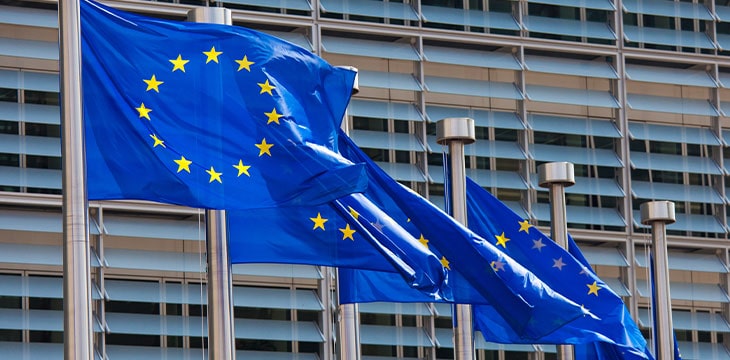|
Getting your Trinity Audio player ready...
|
The European Union (EU) is set to discuss new regulations that would enforce freedom of choice for users of smartphone apps and other digital platforms. The proposed Digital Markets Act aims to restrict large tech players from herding users towards dominant platforms, where users may have less privacy or control over their own data.
The proposal, which is still in its early development phase, refers to platforms with “gatekeeper” powers. These can be large or small but are able to exert control over users’ behavior in many ways through censorship, data harvesting, advertising, lack of compatibility with other platforms, and restrictions on what apps can be installed or removed.
Bitcoin proposes a “transaction-based” model for online communications, where data remains sovereign to the user who created it, and access rights to that data rely upon the user’s own choice. This affects dominant platforms’ ability to snoop and harvest user data, as well as the potential to use that data for targeted (and often highly-personalized) advertising. Since these are also prime revenue streams for businesses, Bitcoin’s transaction model would instead revolve around nano and micro-transactions based on content and functionality. Twetch and Relica are two existing social network examples of this.
“Free” apps like Twitter and Facebook appear less free when users realize how these companies monetize the data they upload—building detailed digital profiles of individuals, their friends and contacts, purchasing habits, even family and health information.
If created and passed by the bloc’s legislative bodies, the EU’s Digital Markets Act would become a “Regulation” that has direct binding over member states without needing ratification by each country’s national parliament. A similar existing regulation is the EU’s GDPR (General Data Protection Regulation), adopted in 2016, which also aims to protect data privacy.
The Digital Markets Act proposal would still be discussed and negotiated between the EU’s three main legislative groups before it becomes law. These include the directly-elected EU parliament, the Council of the EU (consisting of EU member state ministers), and the European Commission (the EU’s “executive branch” composed of one nominated representative per member state). The Commission is seen as the EU body with the most power/influence over the regulatory direction.
The three groups are expected to finalize the exact wording of the new Regulation this week. Reports have noted that the proposal “appears to have momentum,” with the EU Parliament and Council seeking tougher rules than the Commission originally suggested and looking to pass them quickly.
The “gatekeepers” mentioned in discussions could include platforms with more than 45,000 users. This immediately includes all the existing large platforms, but the number is low enough to fit many smaller and independent apps. The EU focused on email, search engines, and messaging applications. However, the “gatekeeper” tag could also apply to e-commerce platforms, “gig economy,” and networking apps like Uber and Airbnb, and others.
Larger platforms, in recent years, have faced frequent accusations that they attempt to control public behavior and discourse by tagging and censoring posts, banning certain users, or limiting their ability to “monetize” content, and by controlling which apps can be installed or uninstalled.
Moreover, even apps that appear less restricted still harvest and sell personal content/data their users provide, creating privacy concerns. Their processes and partnerships are opaque, with users never knowing where their data may end up (or how it may eventually be used).
If the Digital Markets Act is successful, it could impose “commercially painful” changes on those larger providers and keep the door open for alternatives as well as alternate revenue and data ownership models, like Bitcoin’s.
Watch: CoinGeek New York presentation, The Path to BitCoin Adoption: How to Turn the Entire Web into Bitcoin Apps

 02-20-2026
02-20-2026 




